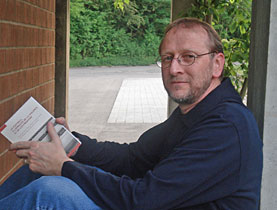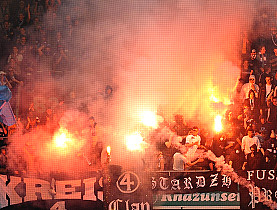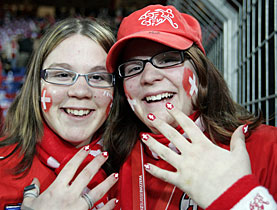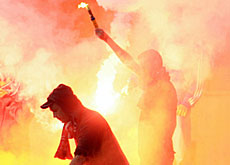Getting into the mind of a football hooligan

Football-related violence runs in cycles, a Swiss sociologist who has made an academic study of hooligans tells swissinfo.
Sometimes it is the turn of England, then Italy, and now Switzerland – especially now, with Euro 2008 underway, says Thomas Busset of the International Center for Sports Studies, attached to Neuchâtel University.
To get a better grasp of the football scene in Switzerland so as to be able to take more effective measures to deal with problems, it is important to understand how fans live from day to day and what goes on in the heads of hooligans, he says.
Busset and his team did not simply hand out questionnaires or interpret existing statistics. They went to matches themselves and mingled with the fans, got to know them and conducted face-to-face interviews.
As a result they gained some interesting insights which influenced security policy ahead of Euro 2008, which is being co-hosted by Switzerland and Austria.
swissinfo: What is so interesting about hooligans for you as an academic?
Thomas Busset: For me it isn’t so much the concept of “hooligan” as the much broader idea of the “militant football fan”. This is something that covers several different movements. Hooligans are only one of them.
As social scientists, our team is interested in sport and society. In this context football fans raise a lot of issues.
swissinfo: Which came first, football or extreme fans? And does it always have to be football?
T.B.: It doesn’t have to be football, but there must be a large number of spectators. Young men have always behaved violently towards each other. Gotthelf [a 19th century Swiss writer] wrote about youths beating each other up at hornussen games [a traditional Swiss rural sport].
What is new is that since the beginning of the 1960s there has been a subculture movement in Europe, which is now world wide, but which had its origin in England. Since then, these movements have spread and are now described as hooliganism.
swissinfo: Why do the cycles of violence occur in such different ways in the different European countries?
T.B.: As football has become internationalised, hooliganism has spread out all over Europe. And the fans have become more radicalised. The original hooliganism in England was social rather than political. Since the 1970s – and again this happened in England first – rightwing extremists have tried to appropriate the movement for political ends.
This started happening here in Switzerland at the beginning of the 1980s. There was also an influence from Italy, where fans – and young people as a whole – were politicised and radicalised long ago. In their behaviour in the stadium fans copied methods used in the socio-political arena – which is where the expression “ultras” comes from.
swissinfo: So the ultras were initially rightwingers, but now they are more like local chauvinists. What’s the next step?
T.B.: It all depends on the country. Hooligans may be rightwing radicals or apolitical. The younger fans in Switzerland today describe themselves as “ultras”. So they behave differently from hooligans in the stadium.
Today’s ultras in Switzerland regard themselves as politically neutral: politics has nothing to do with what goes on in the stadium. By chanting and dancing and waving their banners they try to get as many people involved as possible. Politics, or women, are therefore regarded as divisive.
swissinfo: Ultras are almost always militant, male, Swiss and young. People often say that these young men used to get discipline in the army. Now the only chance they have to let off steam is either at the football stadium or at the World Economic Forum
T.B.: The majority of fans are indeed Swiss, but there are more “secondos” [people born in Switzerland of foreign parents] involved than people think. They are fully integrated in their town or region, they have a network and therefore identify with their football club as their “new home”.
Seen from outside, the fan scenes appear to be very similar to each other. But from the inside you can see that they are split into cliques, the same ones which are found in people’s ordinary lives, at school or in their neighbourhood.
But more recent immigrants who want to make a mark are to be found less in the stadium than on the roads, where they make their presence felt doing something else with their free time – for example street racing.
swissinfo: Meanwhile these ultras have already seriously damaged Switzerland’s image at matches before Euro 2008. Why haven’t the authorities in charge of security used the results of your research before now?
T.B.: One important thing we have learnt is that people who describe themselves as the “ultras” of a particular club rarely get together with fans from another city in order to join forces on behalf of the national team.
Of course they like to follow a game as individuals, but not really as part of a “Swiss fan group”. It’s possible that they might run up against groups of fans from other countries, in order to get themselves noticed in the cities where the games are being played or in order to provoke each other.
But this is unlikely to happen inside the stadiums because the security measures there are too strict. The situation is more dangerous outside in the cities themselves, in the public viewing zones and the fan camps. An extra problem has inadvertently been created.
swissinfo: So what ought to be done now?
T.B.: On the one hand there are the fans who behave provocatively throughout the year, and on the other there is the one-off European championship.
People keep calling for more repressive measures, instead of putting the emphasis on prevention, such as engaging in dialogue with the fans. A police presence is not prevention but deterrence. The greater the police presence, the more likely it is that fans will gang together and clash with their opponents – less frequently, it is true, but all the more violent for that.
swissinfo-interview: Alexander Künzle
Thomas Busset is a historian who has worked in a number of institutions, including Lausanne University and the Federal Institute of Technology in Zurich.
He was a member of the independent commission of experts investigating Switzerland in the Second World War.
He has carried out research in urban and regional sociology and the history of statistics in Switzerland.
His current research projects cover the areas of hooliganism and the history of Swiss winter sports.
Since 2004 he has worked at the International Center for Sports Studies at Neuchâtel University.
He and his team studied the militant fan scenes of three Swiss football clubs – Basel, Young Boys (Bern), and Servette (Geneva) – as part of the national research programme into rightwing extremism.

In compliance with the JTI standards
More: SWI swissinfo.ch certified by the Journalism Trust Initiative



You can find an overview of ongoing debates with our journalists here. Please join us!
If you want to start a conversation about a topic raised in this article or want to report factual errors, email us at english@swissinfo.ch.